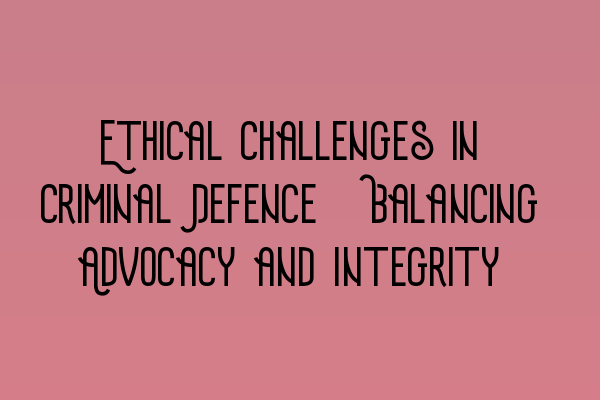Ethical Challenges in Criminal Defence: Balancing Advocacy and Integrity
As criminal defence solicitors, we often find ourselves facing ethical challenges where we must balance our role as advocates with our commitment to maintaining integrity. Criminal defence work is a crucial aspect of the legal profession, and ensuring fair representation for individuals accused of crimes is essential for upholding justice. However, navigating the fine line between vigorous advocacy and ethical conduct can be a complex task.
The Importance of Advocacy
Advocacy lies at the core of our role as criminal defence lawyers. We are entrusted with the responsibility of zealously representing our clients, protecting their rights, and presenting their case in the most favorable light possible. Our duty is to challenge the prosecution’s evidence, cross-examine witnesses, and present arguments that support our clients’ interests. Effective advocacy is vital in ensuring a fair and balanced criminal justice system.
The Ethical Dilemma
However, the pursuit of advocacy must always be tempered with ethical considerations. We must constantly assess the balance between advancing our clients’ interests and adhering to the principles of integrity, honesty, and justice. We face ethical challenges when our duty to represent our clients conflicts with our personal and professional obligations.
Confidentiality and Disclosure
Confidentiality is a fundamental aspect of the solicitor-client relationship. It allows clients to confide in us and ensures open communication. However, ethical dilemmas arise when clients disclose information that may implicate themselves or others in criminal activity. The tension between maintaining client confidentiality and avoiding aiding or abetting criminal conduct requires careful navigation.
In these instances, criminal defence solicitors must adhere to their duties under the Code of Conduct while also upholding public interest. The decision to disclose information or limit the representation should be made in consultation with the client, ensuring their informed consent while staying within the bounds of the law.
Dealing with Guilty Clients
Another ethical challenge arises when dealing with clients who have admitted guilt or whose guilt is evident. While these individuals are entitled to a defence, our duty as solicitors requires us to avoid misleading the court or engaging in dishonest practices. Balancing the duty to act in the client’s best interests with maintaining our ethical obligations can be difficult.
However, it is our responsibility to present the case honestly and accurately. Exploring alternative arguments, challenging the prosecution’s evidence, and ensuring due process are essential components of our role. We must strike a balance that upholds the principles of justice while respecting our ethical obligations as officers of the court.
Responding to Pressure
As criminal defence solicitors, we often face pressure from various sources, including clients, the media, or public opinion. This pressure can pose ethical challenges, especially when it compromises our ability to provide effective representation or act in accordance with our professional obligations.
In order to navigate these challenges, it is crucial to have a strong ethical framework and a commitment to maintaining professional integrity. Staying informed about legal developments, seeking support from professional networks, and engaging in continuous professional development can help us make informed decisions and withstand external pressures.
Conclusion
The ethical challenges faced by criminal defence solicitors are inevitable. Balancing advocacy and integrity requires constant vigilance and an unwavering commitment to the principles of justice. It is only by maintaining ethical conduct that we can ensure the integrity of the criminal justice system and provide effective representation for our clients.
For more information on SQE Criminal Law & Practice and related topics, check out the following articles:
- SQE 1 Practice Exam Questions
- SQE 1 Practice Mocks FLK1 FLK2
- SQE 2 Preparation Courses
- SQE 1 Preparation Courses
- SRA SQE Exam Dates
